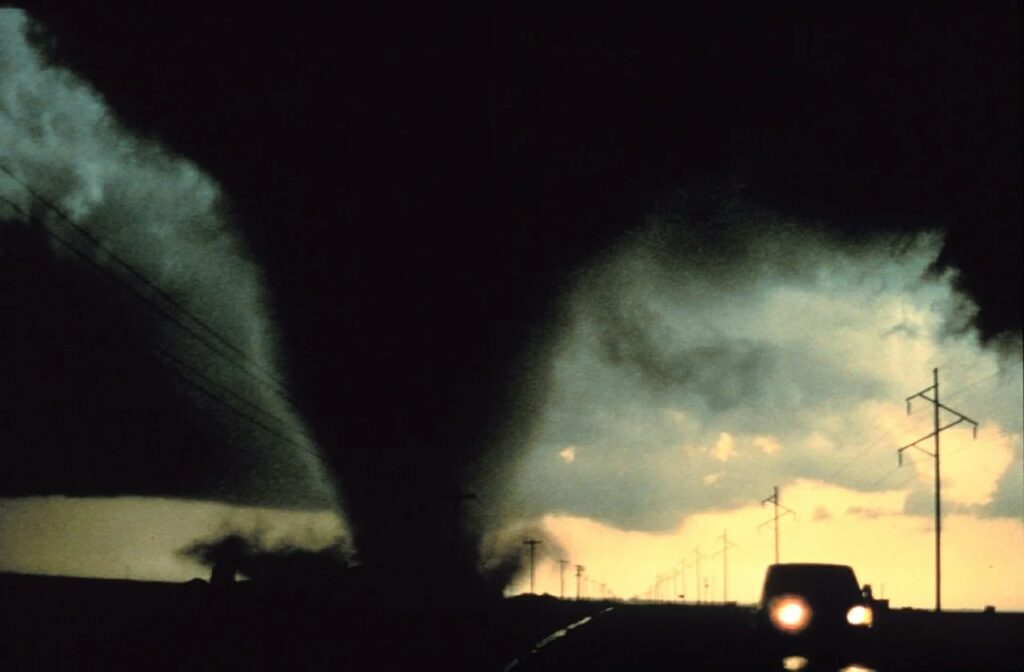Tornado Warning
This summer I saw the movie Twister, about tornadoes and those who study them. In the opening sequence a little girl’s life changes forever when a tornado crosses her homestead; it snatches away her father. From that moment she sets herself to hunt down these vortices. As an adult she pursues them, studies them, tries to predict their behavior in order to give people advance warning to escape. As the characters encounter tornadoes of increasing strength, one is awestruck at their sheer destructive force. They lay waste, showing mercy to no one.
Later, a competing tornado chaser, bent on glory, underestimates an oncoming tornado and ignores a crucial warning. He and his driver pay for their misstep with their lives.
In reality, it is vital to know what’s out there, even if understood with only rough sketches. Those who apprehend some reality and portray it do a service to their fellow men; the tornado chasers were such. If someone who has never seen a tornado is warned of an oncoming one, he may either heed the warning, or think it ludicrous and stay in its path. Ignorance of the tornado’s danger, however, will not protect him from its effects.

As you arrive at Yale and take in “the lay of the land,” the hum of college life, don’t ignore physical, medical, and yes, spiritual reality. If you do, it will affect your life regardless. If you take it into account, however, you will have some say in how that reality affects you.
Some people think of sin as an archaic, irrelevant abstraction, a theological construct, an idea. The Judeo-Christian Scriptures warn of it as a force to be reckoned with—a spiritual tornado.
God created a world in which actions have consequences. Every year there are casualties among those who hang out on the beach to watch a hurricane while everyone else has taken cover. So it is with sin. The idea “you can dabble with sin and get away with it” attempts to sell you the dangerous line: “There are no consequences for this.”
Some people stay away from alcohol abuse and illicit drugs because they believe warnings about how they damage the mind. Others are taken in by the pressure of their peers: “Oh come on, just try it once; it won’t hurt you,” and then suddenly find themselves losing control.
Many blithely accept that same line concerning sexual relationships. The Bible clearly demarcates the consequences of “just trying it.” Proverbs 6, speaking of sexual promiscuity, asks, “Can a man scoop fire into his lap without his clothes being burned? Can a man walk on hot coals without his feet being scorched?”
Medically, the statistics are shocking: a Berkeley University study in 1991 showed that 46% of the women who used the university health services were infected with the sexually-transmitted disease human papilloma virus (HPV), which is the principal cause of cervical cancer. 1
Concerning illicit drugs, a study in 1968 in New York City found that of 168 young people who had used marijuana, 40% later began using heroin. 2
When it comes to dealing with sin, you can’t afford to underestimate its force, its deadliness. “The waywardness of the simple will kill them, and the complacency of fools will destroy them.” (Proverbs 1)
“Destroyed” for taking something lightly? Yes, because when you deal with a tornado: you cannot tiptoe to its edge, stick your hand in to see what it feels like, and not be sucked in.
Contrasting “Wisdom” with “Folly” Proverbs 9 says that Folly calls “to those who lack judgement. ‘Stolen water is sweet; food eaten in secret is delicious!’ But little do they know that the dead are there, that her guests are in the depths of the grave.”
Prem Thomas, M.D., Morse ’89
1 Bauer et al., Journal of the American
Medical Association, Jan. 23, 1991.
2 Phillips, The Bible, the Supernatural, and the Jews, (Camp Hill, PA: Horizon Books, 1995), p. 262.

